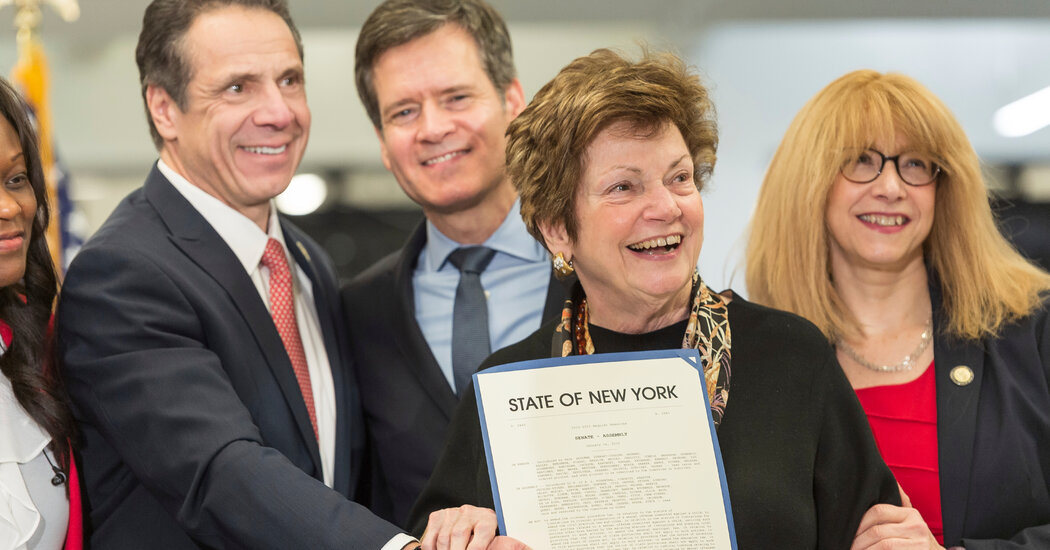Margaret Markey, a former New York State legislator who, motivated in part by her own son’s account of sexual abuse by a priest, successfully championed a law allowing victims of molestation to seek restitution from predators — and even from a predator’s employer — many years after the crime, died on Sept. 24 at her home in Queens.
The cause was complications of Alzheimer’s disease, said her daughter, who is also named Margaret Markey.
Ms. Markey, a Queens Democrat, introduced the legislation, the Child Victims Act, in the State Assembly in 2006 and for years continued to push for it in the face of opposition until it was finally signed into law in 2019. It had passed the Assembly but was stalled in the State Senate by Republicans, who had controlled that chamber until the 2018 elections.
The law empowers prosecutors to bring criminal charges against sex abusers and their employers until a victim turns 28, instead of 18, the cutoff age under the previous statute of limitations.
The Roman Catholic Church, of which Ms. Markey was a practicing member, was among the foremost opponents of the legislation, which emerged at a time when the church was embroiled in numerous scandals involving priests accused of sexually abusing children years earlier.
The New York State Catholic Conference, the policy arm of the state’s Catholic bishops, said in testimony submitted to the State Legislature in 2018 that the measure “would force institutions to defend alleged conduct decades ago about which they have no knowledge and in which they had no role, potentially involving employees long retired, dead or infirm, based on information long lost, if it ever existed.”
Ms. Markey, an assemblywoman who represented heavily Irish Catholic neighborhoods in Queens, was seeking a 10th term in 2016 when she was defeated in the Democratic primary. She attributed the loss in part to fierce opposition by the church, although other issues, like a proposed homeless shelter in her district, contributed to her defeat.
Out of office, she continued her crusade to extend the statute of limitations for sexual abuse victims who seek to pursue civil and criminal remedies.
When the legislature finally approved the Child Victims Act in 2019, Ms. Markey attended the bill-signing ceremony in Manhattan, in which Gov. Andrew M. Cuomo, also a Democrat, called her efforts “a profile in courage.”
“It’s tough to take on your church,” Mr. Cuomo said.
Ms. Markey began her campaign in 2003 with Marci A. Hamilton, a political science professor at the University of Pennsylvania and the founder of Child USA, a research and advocacy group.
“It took 16 years to get the Child Victims Act passed,” Professor Hamilton said in an email, “but it made a huge difference as nearly 11,000 victims came forward and achieved justice previously denied. Marge was ahead of her time in New York and never gave up.”
Michael Dowd, a New York lawyer who has represented abuse victims, described Ms. Markey as “a hero to the victims of abuse and always an enemy of those who harmed children and those who protected the predators.”
In addition to the Catholic Church, the legislation had also been opposed by Orthodox Jewish organizations, the insurance industry and the Boy Scouts of America, initially because it singled out private institutions, including parochial schools, and their employees. In the final version, public employees and their employers were included.
The final legislation, which was sponsored by Assemblywoman Linda B. Rosenthal, a Manhattan Democrat, also provided for a one-year window, from 2020 to 2021, for victims to pursue civil and criminal claims that had been barred under the previous statute. (The window was extended to two years because of the Covid pandemic.)
During that window, the Diocese of Brooklyn, which includes Queens, was named in nearly 600 of the 3,000 claims filed against Catholic dioceses in New York State.
The law “had a dramatic effect on all the dioceses resulting in settlements totaling hundreds of millions of dollars,” Dennis Poust, executive director of the New York State Catholic Conference, said in an interview.
Even before the law was passed, the Brooklyn diocese had established an Independent Reconciliation and Compensation Program to settle older abuse cases. In response to accusations that abuse allegations had been ignored or covered up for years, in 2024 the diocese agreed, in a settlement with the state attorney general, to hire an independent monitor empowered to oversee its child protection guidelines.
In an interview with The New York Times while the bill was awaiting the governor’s signature, Ms. Markey revealed that her dedication to the cause was motivated in part by her son.
Charles Markey Jr. was in his 30s when he disclosed to his parents that, starting when he was 12, he had been sexually abused by a priest at the parish where the family had worshiped for generations and where he attended parochial school and served as an altar boy.
“You’re a little kid,” he told The Times in 2019, explaining why he waited so long to come forward. “You can’t make those adult decisions. So much is taken away from you. Your self-esteem is destroyed. Your confidence is destroyed.”
Amid her efforts to draw attention to her bill, Ms. Markey tried to explain to fellow legislators: “It is the victims who suffer the most as a result of our state’s archaic statute of limitations for these offenses.”
According to the Brooklyn diocese, Charles’s claim was substantiated by the reconciliation program, but he had not accepted a financial settlement or an earlier offer of counseling.
Charles Markey’s abuser was among 100 priests whom the Brooklyn diocese said in 2019 had been credibly accused of sexually abusing children. The list included his abuser, who continued serving in parishes and schools until he was finally defrocked.
Margaret Mary Nickel was born on Nov. 4, 1941, in Queens. Her parents, John and Margaret (O’Shaughnessy) Nickel, worked for Chase Bank.
After graduating from Grover Cleveland High School in Queens and Berkeley Business School in Manhattan (now Berkeley College) to be an executive secretary, she served as the assistant director of development for Claire Shulman, the Queens borough president at the time, and was later named the borough’s director of marketing and tourism. She was first elected to the New York State Assembly in 1998.
In addition to her daughter and son, she is survived by her husband, Charles, a retired State Supreme Court justice, whom she married in 1964; another son, John; and a granddaughter.
Sam Roberts is an obituaries reporter for The Times, writing mini-biographies about the lives of remarkable people.
The post Margaret Markey, Who Championed Victims of Sexual Abuse, Dies at 83 appeared first on New York Times.




